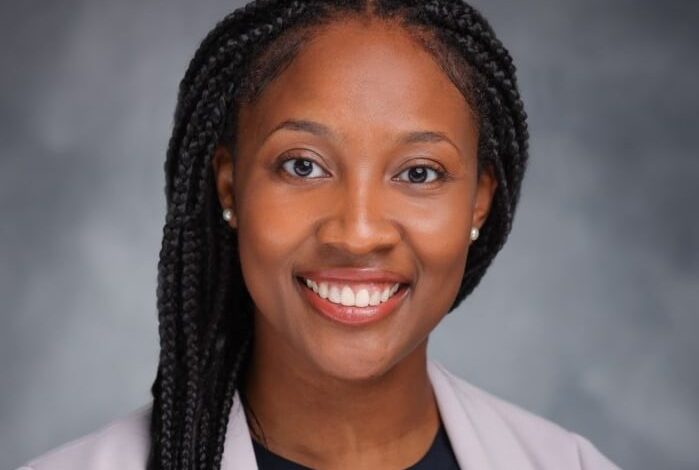I Turned Pain into a Passion—A Black Woman’s Journey!


From the very beginning, Deborah Rose’s, M.D., John Hopkins School of Medicine, journey into the world of neurology was anything but conventional. However, her experiences planted the seeds of a passion that would grow into a lifelong mission: to understand the intricate workings of the brain and to address the social factors that profoundly shape health outcomes.
Early Inspiration and Family Influence
Rose’s interest in neurology began long before medical school. While working in a neuropsychology lab at the National Institute of Mental Health (NIH), she developed a deep understanding of neuroanatomy and the intricate connection between brain function and mental health.
“I learned a lot about neuroanatomy, the brain’s different structures, and how they significantly influence our thoughts, emotions, and behaviors. This is deeply intertwined with mental health, which led me to pursue behavioral neurology and neuropsychiatry,” Rose tells BlackDoctor.org of her time at NIH.
Her decision to specialize in behavioral neurology and neuropsychiatry was also shaped by personal experiences.
“My family’s experiences with neuropsychiatric illnesses also influenced my decision to specialize in neurology,” she adds.
Focus on Social Determinants of Health
In fact, her commitment to addressing social determinants is deeply rooted in her own childhood experiences.
“I’ve seen this in my own family. I come from very humble beginnings; my parents were raised in Jamaica, and my three siblings and I were born and raised in the U.S. We had a challenging upbringing and lacked many resources that people often take for granted today. For example, we struggled financially and moved frequently because we had trouble paying bills. I also saw similar struggles within my extended family in Jamaica, where they didn’t have access to basic resources like indoor plumbing or reliable transportation,” Dr. Rose shares.
These experiences, including those of her mother, who grew up in even more impoverished conditions, played a significant role in Dr. Rose’s desire to focus on the social drivers of health.
“It’s important to consider individuals’ social and environmental contexts, as they impact their ability to afford medications and access necessary healthcare,” she notes.
The Physicians Foundation Fellowship
In 2024, Dr. Rose was named a fellow of The Physicians Foundation, a role that aligns perfectly with her passion to address the determinants of health. The foundation focuses on four strategic goals: improving physician well-being, supporting physician leadership, addressing drivers of health, and amplifying physician perspectives.
“I’m very excited to be the 2024 Physicians Foundation Fellow. My primary focus is on addressing drivers of health. It’s an exciting opportunity to be part of a foundation striving to improve patient care and physician well-being. A big reason I pursued medicine was to care for patients within their social contexts,” Dr. Rose adds.
As part of her fellowship, Dr. Rose is implementing a project at the Community Psychiatry Clinic (CPP) in downtown Baltimore. This clinic serves a population with significant resource limitations, making it an ideal setting for her work. Her project involves screening patients for social determinants of health and connecting them with resources to address identified needs. By doing so, she hopes to improve health outcomes for this underserved community.
“Once these needs are identified, we’ll provide resources to help patients address these challenges,” she shares.”I believe a significant reason social drivers of health continue to impact individuals’ health outcomes is that people aren’t aware of the resources available to help them overcome these barriers. For example, if there’s food insecurity, we share information about food pantries and nutrition education. If they struggle with paying utilities, we provide information about services that can help. There’s a lot of potential for change, and I’m excited about this project within the Baltimore community.”
Translating Research into Practice
Dr. Rose is committed to ensuring that the insights gained from her work are shared with the broader medical community.
“Although the fellowship is only for a year, my aim is to implement a project within this small scope at the clinic and then see how successful it is. We’ll then share the lessons learned with the broader clinical community so they can implement similar strategies. The Physicians Foundation already has many resources for clinicians to start screening for social drivers of health. For example, we initiated a Let’s Take 5 campaign, providing clinicians with resources to ask patients about key drivers of health like food, housing, and transportation, and suggest practical ways to address those needs. My project will run alongside these existing resources, as the foundation is a valuable resource for providing practical guidance for clinicians,” Dr. Rose says.
One of the main challenges Dr. Rose anticipates is the time constraint faced by clinicians. In a typical medical visit, addressing social determinants of health can be difficult due to the limited time available. To overcome this, Dr. Rose plans to optimize her time management by preparing thoroughly for each patient visit, allowing for focused discussions on social drivers of health. She also plans to collaborate with social workers to ensure that patients receive comprehensive support beyond what she can provide during a medical consultation.
Looking ahead, Dr. Rose is determined to continue her work in academic medicine, where she can combine research, clinical care, and education.
“My long-term aspirations include continuing this line of work. It’s critical for clinicians, and everyone in healthcare, to understand that a patient’s social context plays a much larger role in their health outcomes than medical care alone. Factors like lifestyle habits and financial stability, many of which are out of their control, can impact health outcomes up to 80 percent, compared to the 10-20 percent impact of medical care itself, according to the Robert Wood Johnson Foundation. That statistic alone highlights the importance of this work. I want to remain in academic medicine, where I can engage in research related to social drivers of health, continue to screen for these factors, and improve the methodologies for doing so,” Dr. Rose says.
She’s also passionate about continuing to provide clinical care, particularly to underrepresented communities disproportionately affected by various diseases.
“Academic medicine is a great context for this work because it fosters continued inquiry, learning, and teaching. I’m excited about educating my colleagues, peers, and trainees about the importance of this work,” she adds.
Advice for Aspiring Physicians
As Dr. Rose continues this work, she emphasizes the importance of staying connected to the core motivation that drives most clinicians: the desire to help people.
“It’s important for trainees to take as much as they can from their clinical encounters. It’s easy to get exhausted and burnt out with the long hours we work in healthcare today, and that can lead to compassion fatigue. But I want to encourage trainees to hold on to the reason they pursued medicine in the first place,” she advises. “A big way we help people is by listening, caring, and looking beyond surface-level medical factors. Medicine goes far beyond numbers like blood sugar levels or cholesterol. A patient’s social and environmental context plays a much bigger role in their health outcomes than their medical care and medications alone. I encourage trainees to remember this, reflect on their experiences, and discuss them with colleagues or mentors. It’s easy to become dismissive over time, but it’s crucial to remain mindful of the experiences that shape us into the kind of clinicians we want to be.”




